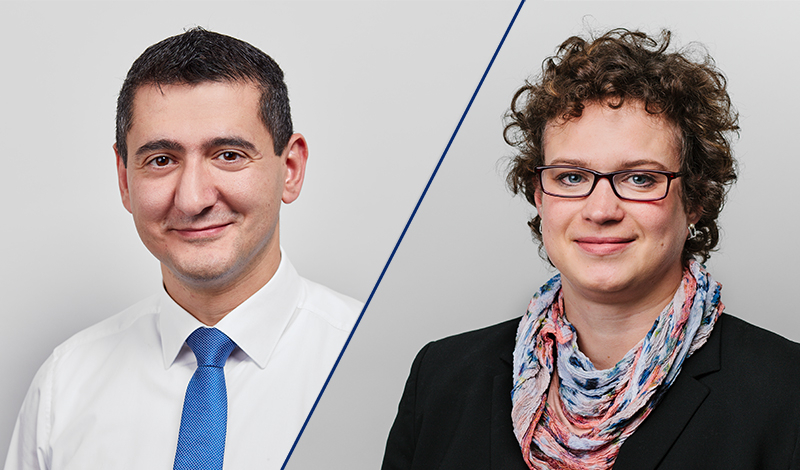
Science Communication: "The right call at the right time"
With 15 million euros, the Foundation is funding four centers for science of science communication. An interview about qualification criteria and the contribution to a highly topical field of research.
Cora Schaffert-Ziegenbalg and Selahattin Danisman are in charge of the call for proposals "Science Communication Cubed" in the funding department at the Volkswagen Foundation. After the approval of four centers in summer 2021 they sum up the selection process and take a look into the future.
From the eight applications that made it to the final selection, the international jury of experts decided on four for funding, whereby the thematic focus of each one is quite different. How can such heterogeneous applications be evaluated in a structured way? What were the criteria?
Selahattin Danisman: The call for applications was complex, no question of that, and we had a whole set of criteria. The most important aspect was, of course, the quality of the planned science communication research. After all, the aim here is to make a substantial contribution to the development of this field. Furthermore, the proposed capacity-building measures also played a very important role. In view of this, the jury paid particular attention to whether and in which forms doctoral students and postdocs will be involved and whether offers for Master's programs and graduate schools are planned. Closely linked to the research question was the question of the expertise of the applicant teams, both in research and in practice. And it had to be evident that all members of an applicant consortium would be able cooperate with each other on an equal footing, i.e. scholars and communication research specialists with communication professionals. Equality was an important criterion.

Dr. Selahattin Danisman (left) and Dr. Cora Schaffert-Ziegenbalg oversee the funding initiative "Science Communication Cubed".
Cora Schaffert-Ziegenbalg: Advancing research on science communication is the central motive of the call. However, the practice reference point around which communication formats are to be developed, tested and researched was also of great importance. Fortunately, the centers that have now been approved cover a broad spectrum, ranging from planetary health (Munich) and artificial intelligence (Tübingen) to visualizations of health topics (Kiel) and communication about the science system itself (Rhine-Ruhr).
Danisman: Governance issues also played a role. Different expertise and different ways of thinking are pooled in the centers. How do they work together, which topics will be addressed, and will they be able to continue working after the end of funding by the Volkswagen Foundation? Especially in this context it was most necessary to have a corresponding declaration of intent from the universities involved to support the centers – not only during but also after the end of the funding.
The high funding amount in itself is a differentiating factor for this call. Are there any others?
Schaffert-Ziegenbalg: The funding period of up to eight years is certainly exceptional. Normally, funding institutions limit their commitments to three, at most five years. However, sustainable capacity building and structural anchoring of the centers will take time – and we see ourselves as a reliable funding partner that will accompany and support the centers over a longer period of time.

Encourages the dialogue between research and society: the funding scheme "Additional Funding for Science Communication"
Danisman: Another key differentiating factor is the involvement of expertise from outside the science system – from museums to media to entire city councils. The applicants cast a wide net for their proposals, and we were very impressed not only by the number, but also by the range of different non-scientific actors who will be involved.
In June 2021, the results of the German #FactoryWisskomm were presented. Under its umbrella, at the invitation of Federal Research Minister Anja Karliczek 150 experts debated aspects of science communication for several months and came up with numerous recommendations for practice. Both of you were also members of the working group "Research Field Science Communication". Is research on science communication now suddenly becoming a trendy topic? Is the Foundation at the forefront of a new movement with its funding?
Danisman: The topic has currently come to the fore. But the need became apparent long before #FactoryWisskomm. Two and a half years ago, we at the Foundation began to take a closer look at the idea of strengthening science communication research in Germany. We saw an emerging demand for evidence-based findings that could be used to explain what works and what doesn't in science communication. And, above all, why!
The pandemic has further increased the pressure on research, and by now at the latest it should be clear to all actors in the scientific world that science communication needs commitment, perseverance and money. From the Foundation's point of view, we are of course happy to be able to take on a pioneering role at the absolutely right time with such a thoroughly prepared call jointly developed with many experts.
Schaffert-Ziegenbalg: It was, of course, very satisfying for us to see that many of the desiderata identified in the mentioned "Research Field Science Communication" working group have already been taken up in our call for proposals, e.g. capacity building or increased exchange between research and practice. Of course, this does not mean that the four centers will be able to solve all the challenges facing science communication research in Germany, but it is certainly a good start.
The projects have now been approved. What happens next?
Schaffert-Ziegenbalg: At the beginning of December 2021, we will offer a kick-off event in Hannover – to get to know each other and network. We will bring the four centers together and jointly clarify questions that are on everyone's mind during the organizational phase.
Danisman: We are looking forward to finally meeting in person the people whose applications we have been working on so intensively over the past few months. And we look forward to advising the centers on their way forward. Together we can achieve great things, there is no doubt about that.
